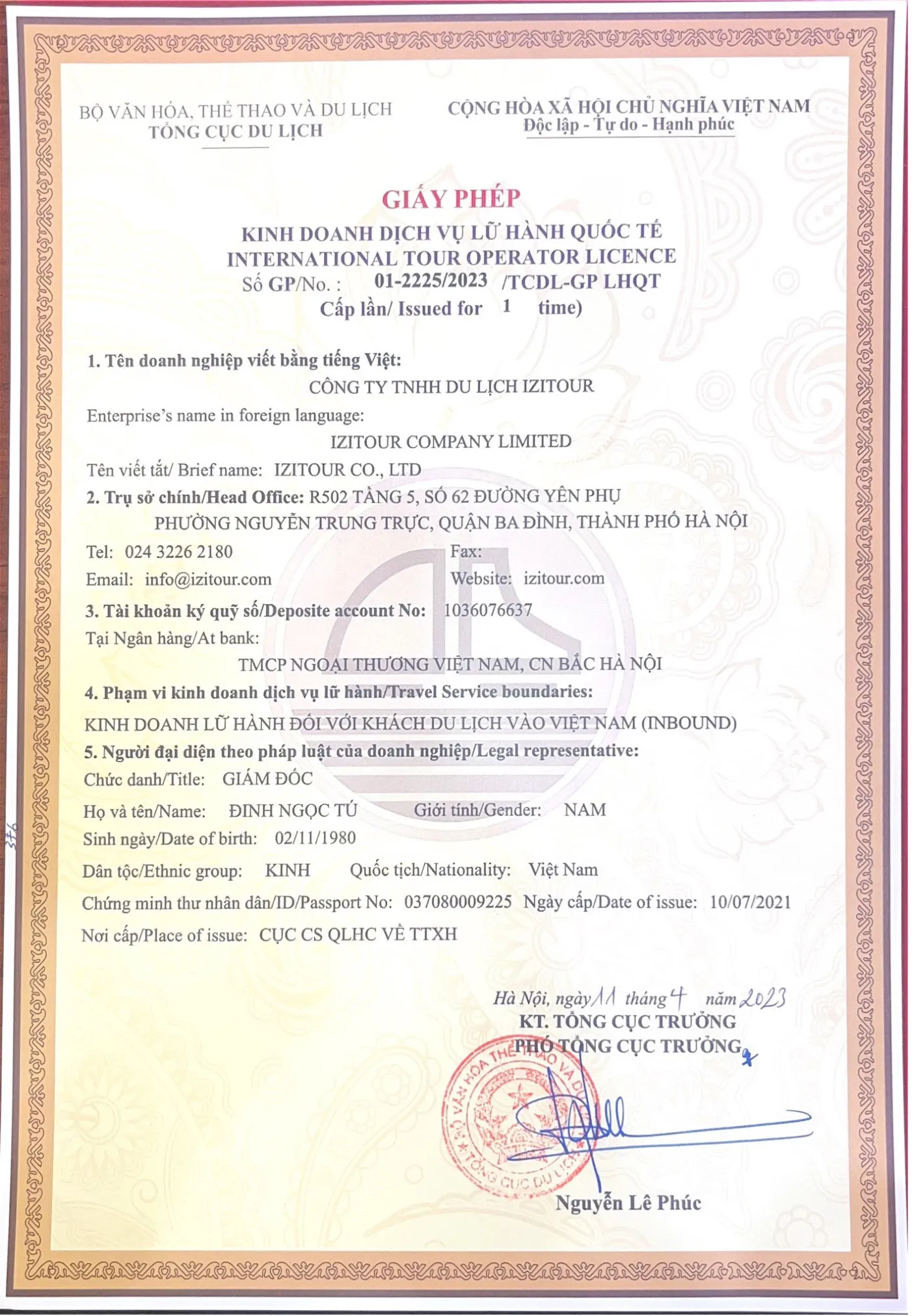Vietnam's New Year, known as Tet, is a vibrant and significant celebration that marks the beginning of a new lunar year. It is a time when families come together to pay homage to their ancestors, exchange well wishes, and indulge in a wide array of traditional foods. In this blog post, we will dive into the delightful culinary traditions of Vietnam's New Year and explore the mouthwatering Vietnamese New Year dishes that grace the tables during this festive season.
1. Bánh Chưng & Bánh Tét (Sticky Rice Cakes)
When talking about Vietnamese New Year foods, you can't leave out Banh Chung and Banh Tet. People think of these famous sticky rice cakes as the perfect Tet food. Banh Chung and Banh Tet basically have the same ingredients: sticky rice, mung beans, and fatty pork belly and are carefully wrapped in arrowroot or banana leaves. The difference falls into the shape: Banh Chung is square, symbolizing the Earth while Banh Tet is formed round and symbolizes the tightly knotted relationship between parents and children. Whether Banh Chung or Banh Tet is thought to bring luck and wealth for the coming year.
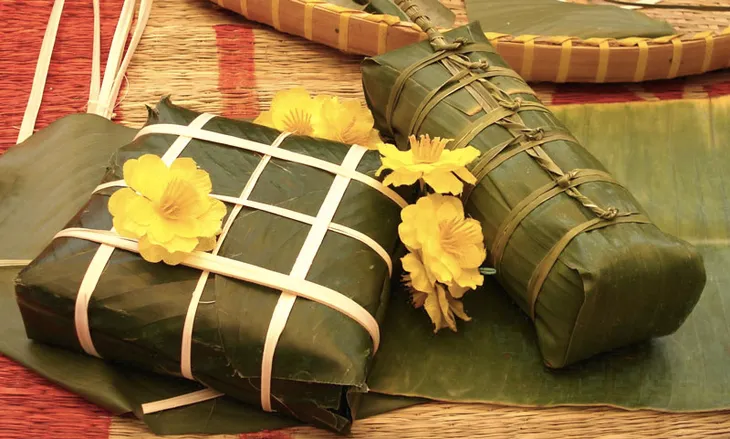
After all the ingredients are carefully wrapped under the leaves, Vietnamese put it into a large cooking pot, pour over the pre-boiled water and cook under wood-fired stoves for about 8-9 hours. This slow cooking process ensures that the rice and beans become tender and flavorful. The end result is a dense, sticky rice cake with a savory filling. Boiled Banh Chung and Banh Tet are typically sliced into discs before serving. The stickiness of the rice together with the creamy mung bean and fatty pork belly melt in your mouth. The best condiments of these sticky rice cakes are pickles, Vietnamese ham dipped in fish sauce.
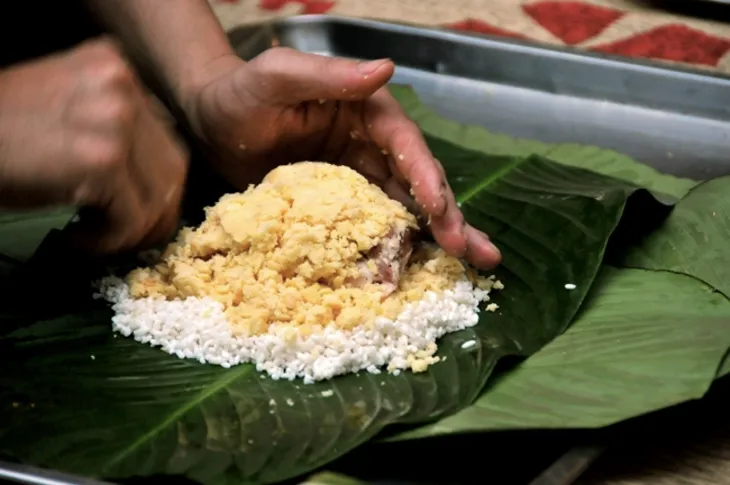
In Vietnamese society, both Banh Chung and Banh Tet are deeply rooted and are seen as necessary gifts during Tet. In the days before the holiday, families often get together to make these rice cakes, making it a beloved activity for everyone. People see the process of making Banh Chung and Banh Tet as a way to remember their elders and keep cultural customs alive.
People eat these rice cakes as a traditional dish during Tet and also give them as gifts to friends, family, and valued leaders to bring them luck and wealth in the coming year. Banh Chung and Banh Tet are important parts of the Vietnamese New Year celebrations because they are tasty and have meaningful meanings.
2. Xôi Gấc (Red sticky rice)
Xoi Gac, or red sticky rice, is a colorful and lucky Vietnamese new year food. The vivid red color comes from the Gac fruit, a tropical fruit that is native to Vietnam. The sticky rice has a slightly sweet taste because it is cooked with Gac fruit puree. People believe that the color red keeps away bad forces and is linked to happiness and wealth. During the Tet holiday, it is often served with other traditional foods.
This food, Xoi Gac, can be eaten by itself or with other dishes that are savory, like Banh Chung or Nem Ran.
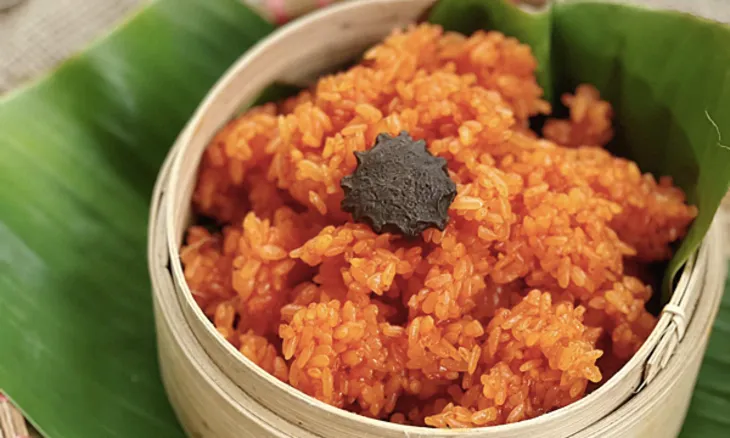
Xoi Gac has become more popular outside of Tet in recent years. You can find it on many Vietnamese dessert tables or as a bright addition to parties and other special events.
3. Nem Rán (Spring Rolls)
During Tet, everyone loves Nem Ran, which are Vietnamese fried spring rolls. The outside of these tasty treats is crispy, and the inside is filled with a tasty mix of ground pork, shrimp, veggies, and glass noodles. They are often served with fresh greens and lettuce leaves, which you can use to make a cool bundle and dip them in a sour fish sauce. Nem Ran are thought to bring good luck and wealth, and their golden color is thought to reflect these things.
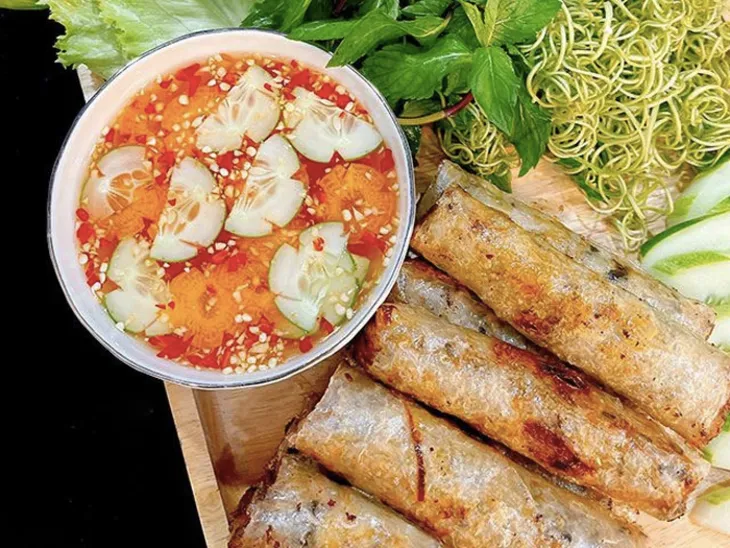
People eat Nem Ran as a starter, but when served with rice or noodles, it can also be a major dish. A lot of Vietnamese people love Nem Ran because it's tasty and rewarding. The crispy outside, the salty inside, and the unique dipping sauce make it even better.
Nem Ran has many variations due to regional culture and tradition. In the South where Nem Ran is called “Cha Gio”, people also included some shredded sweet potatoes/taro inside the filling to create more textures.
4. Giò chả (Vietnamese Ham)
During Tet, you have to eat Gio Cha, which is Vietnamese ham. To make this tasty treat, meat (any kind, but pork is the most popular) is ground up, mixed with different herbs and spices, shaped into a loaf, and then steamed or boiled. Gio Cha is usually served cold, which makes it great for sticky rice or with Banh Chung. It stands for the hope of a happy and long-lasting family life.
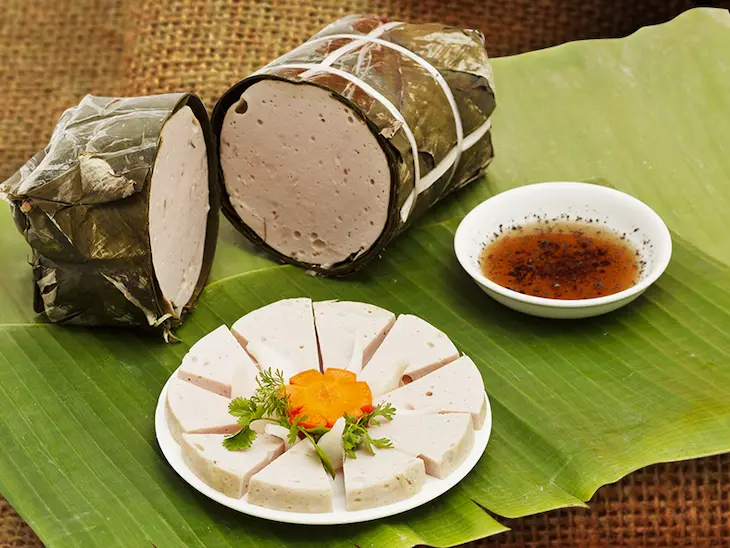
There are a lot of Vietnamese Ham variations across the country. Gio Cha can be made of pork, beef, chicken, and normally added the black pepper inside for a nice flavor. The best way to eat Gio Cha during the Tet holiday is not Banh mi, sadly (save it for another day except Tet). Dip it into virgin fish sauce coated with ground black pepper and pair with Banh Chung, Banh Tet or Xoi. It is a perfect pair of Vietnamese New Year food.
5. Gà Luộc (Boiled chicken)
A simple but traditional meal that is often made and eaten in Vietnam during the Tet holiday is boiled chicken, which is called "Ga Luoc" in Vietnamese. It is often used at Tet feasts because it is easy to make, can be used in different ways, and has a religious meaning. You will see that Vietnamese usually include a Ga Luoc in many occasions such as weddings, ceremonies and special holidays.
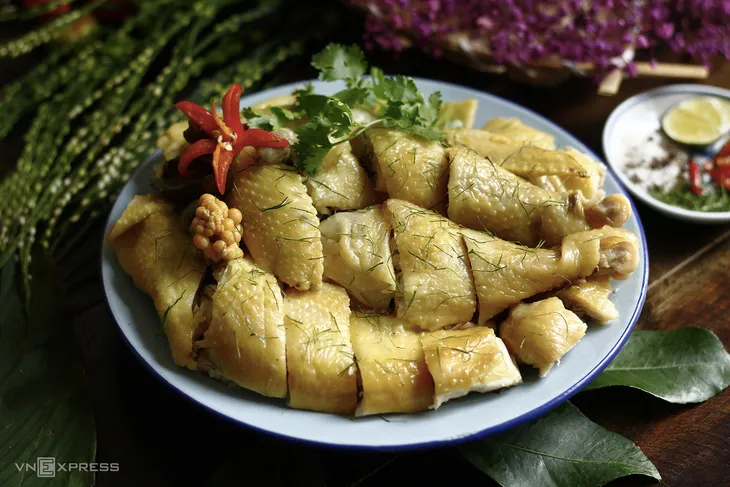
Ga Luoc doesn't require much effort to cook but it tastes delicious with super thinly striped lime leaves, salt and pepper on the side.
6. Dưa Món (Pickles)
Tet pickles, also known as Dua Mon, are a mix of fruits and veggies that are pickled ahead of time and served as a side dish or seasoning during the holiday. These pickles give the Tet feast a wonderful mix of tastes, textures, and bright colors.
Tet pickles are made with a lot of different fruits and veggies that are pickled in different ways and with different flavors. Carrots, daikon radishes, onions, bean sprouts, cabbage, and different kinds of peppers are all veggies that are often used. You can also pickle fruits like cucumber, green papaya, banana, and eggplant fruit.
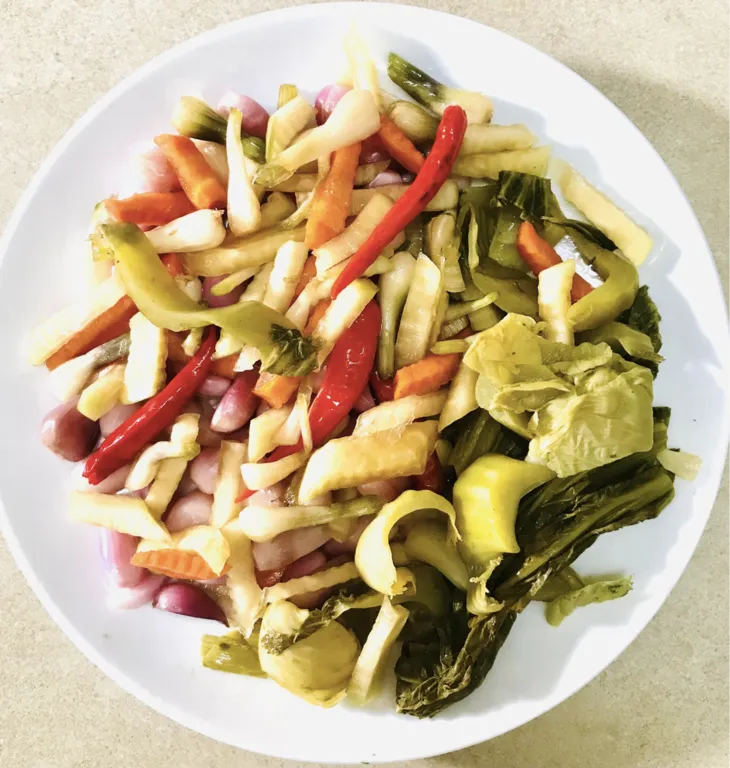
Tet pickles are often served with other favorite Tet foods as a side dish or topping. They add a cool and sour taste to the heavy, spicy foods that people usually eat during the holidays. The pickles are good on their own or with other foods, like Banh Chung, Nem Ran (fried spring rolls), grilled meats, or rice meals. They add brightness and crunch to the meal by having different tastes and textures.
7. Canh (Soup)
A typical Vietnamese new year food table cannot miss a bowl of hot soup. People often make these soups with items that stand for luck, wealth, and good fortune in the coming year.
Of all the tasty Vietnamese New Year's foods, pork skin soup is one of the most important parts of the classic Hanoian feast. It is quite sophisticated to make it during Tet holiday because there are so many ingredients needed to include and cook perfectly: 4-5 different kinds of veggies with different colors, the pork skin, the little mushroom wrapped in silky grounded pork, the light and delicate broth.
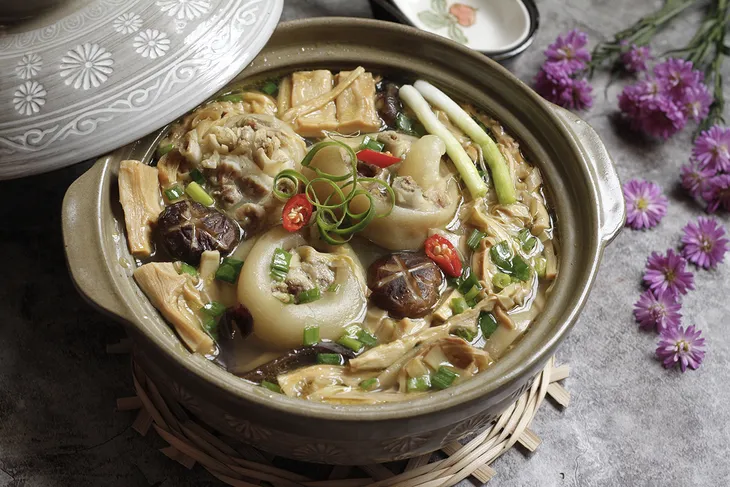
A famous Tet soup called Canh Mang is made with bamboo shoots and pork or shrimp. Vietnamese culture sees bamboo shoots as a sign of growth and wealth. The soup is made by slowly cooking bamboo shoots, meat, mushrooms, and other veggies in a light stock that has fish sauce and other spices added to it. People eat this soup as part of the Tet feast because it is pleasant and healthy.
For Tet, Canh Kho Qua is a soup made with bitter melon, which is thought to be lucky and good for you. Bitter melon is cut up and cooked with different kinds of veggies, meat or fish, onions, and garlic. Most of the time, the soup is light and pleasant, and it tastes a little bitter. It is known for being good for you and is often eaten with other Tet foods.
8. Other savory dishes
8.1. Thịt kho trứng (Caramelized pork and egg)
Thit Kho Trung is a traditional Southern Vietnamese meal that is served during Tet. It's got a savory and somewhat sweet taste since it's made with braised pork and hard-boiled eggs cooked in a caramelized sauce. Thit Kho Trung's signature taste, which is a harmony of salty, sweet, and umami, comes from the caramelized sauce. Boiled eggs lend a rich texture and flavor to the meal, while braising the pork in the sauce makes it soft and succulent.
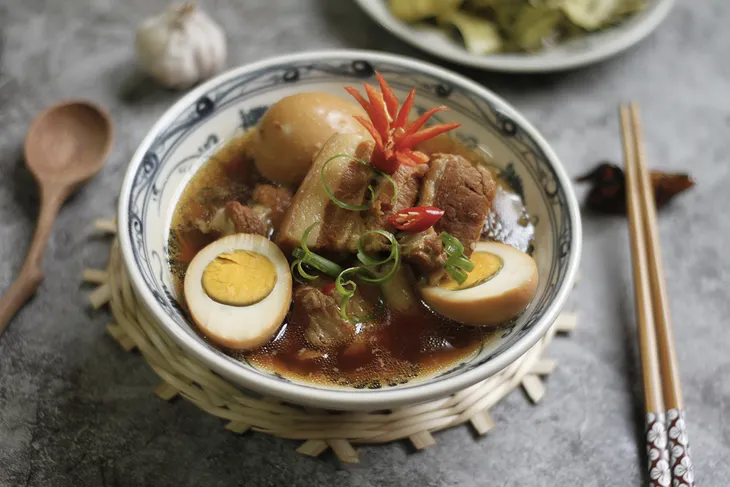
Thit Kho Trung is a must-have dish at Tet in Southern Vietnamese culture. It's a symbol of happiness and togetherness in the home. Pork and eggs are often served at Tet celebrations because the combination stands for prosperity and new life. It's common practice to make a huge batch of Thit Kho Trung so that there's plenty to go around for everyone.
8.2. Thịt đông (Jellied meat)
While “Thit kho trung” is widely eaten during Tet in the South, Thit Dong is one of the most essential dishes in Tet holiday in the North. It's an excellent dish consisting of pig trotters, ears, and other gelatinous portions. The meat becomes hard and easy to slice after being cooked.
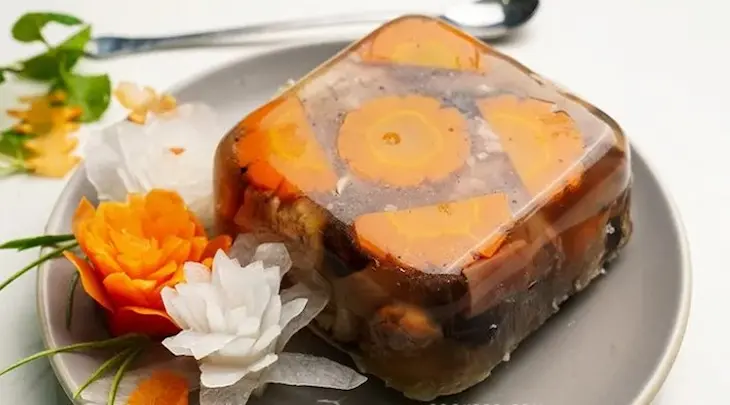
The gelatin part comes naturally from the meat and the bone. Thit dong is supposed to be served cold. When you pair it with a bowl of rice, the cool jellied parts just melt in your mouth.
Tet, the Vietnamese New Year, is a time of celebration, family get-togethers, and delicious traditional cuisine. From the Banh Chung and Nem Ran to Xoi Gac, these foods not only tickle the taste senses but also contain significant cultural importance. They are a symbol of success, wealth, family harmony, and high expectations for the next year. If you have a friend inviting you to join in his/her Tet meal, say yes and you'll learn about this country's special festive cuisine.
See more related articles:
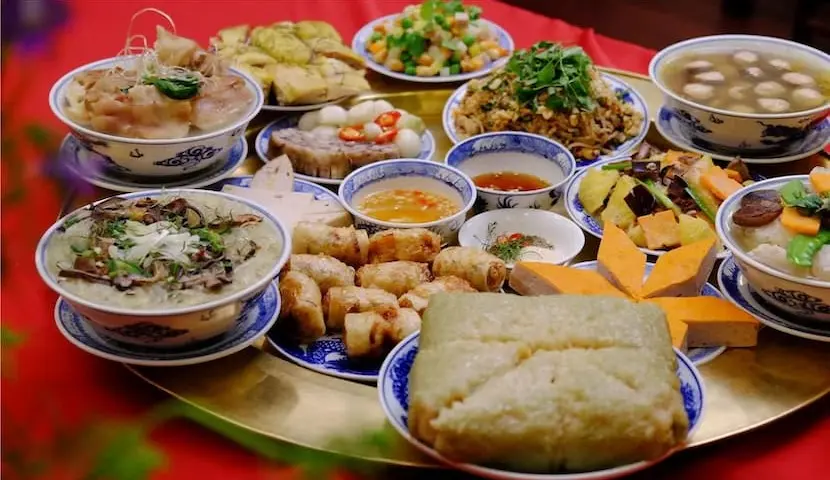







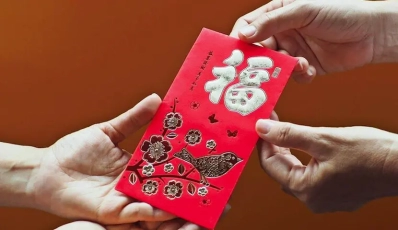

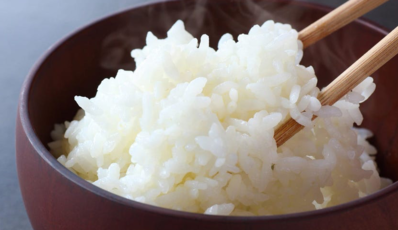

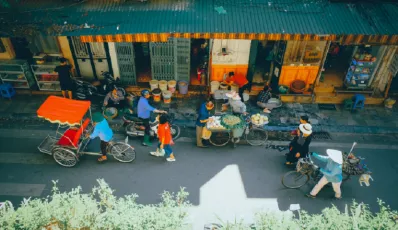
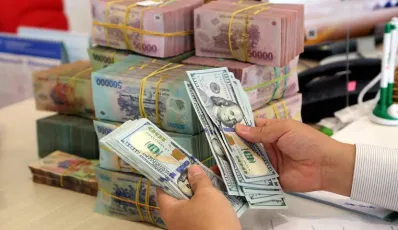
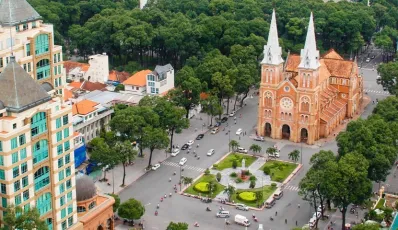



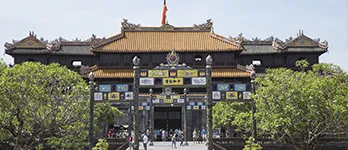


 TRAVELERS' CHOICE 2025
TRAVELERS' CHOICE 2025 